Hermenaut: Philip K. Dick
By:
October 5, 2011
This article was first published in Hermenaut #15 (Summer 1999). Hermenaut was published and edited from 1991-2000 by HiLobrow cofounder Joshua Glenn. Click here to read more from Hermenaut and Hermenaut.com.
GOLDEN-AGE SCI-FI at HILOBROW: Golden Age Sci-Fi: 75 Best Novels of 1934–1963 | Robert Heinlein | Karel Capek | William Burroughs | E.E. “Doc” Smith | Clifford D. Simak | H.P. Lovecraft | Olaf Stapledon | Philip K. Dick | Jack Williamson | George Orwell | Boris Vian | Bernard Wolfe | J.G. Ballard | Jorge Luis Borges |Poul Anderson | Walter M. Miller, Jr. | Murray Leinster | Kurt Vonnegut | Stanislaw Lem | Alfred Bester | Isaac Asimov | Ray Bradbury | Madeleine L’Engle | Arthur C. Clarke | PLUS: Jack Kirby’s Golden Age and New Wave science fiction comics.
NEW WAVE SCI-FI at HILOBROW: 75 Best New Wave (1964–1983) Sci-Fi Novels | Back to Utopia: Fredric Jameson’s theorizing about New Wave sci-fi | Douglas Adams | Poul Anderson | J.G. Ballard | John Brunner | William Burroughs | Octavia E. Butler | Samuel R. Delany | Philip K. Dick | Frank Herbert | Ursula K. Le Guin | Barry N. Malzberg | Moebius (Jean Giraud) | Michael Moorcock | Alan Moore | Gary Panter | Walker Percy | Thomas Pynchon | Joanna Russ | James Tiptree Jr. (Alice Sheldon) | Kurt Vonnegut | PLUS: Jack Kirby’s Golden Age and New Wave science fiction comics.
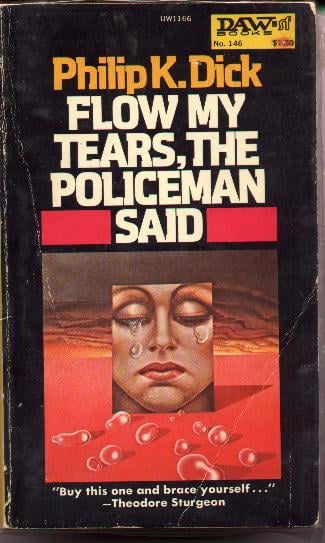
Philip Kindred Dick and his twin sister Jane were born in Chicago — six weeks prematurely, on December 16, 1928 — to Edgar Dick, a livestock inspector for the U.S. Department of Agriculture, and his wife Dorothy. Jane died a few weeks later. Edgar was transferred to San Francisco the following year, but when he was transferred again in 1933, his wife Dorothy (a feminist and pacifist who felt at home in Berkeley) divorced him. Dick rarely saw his father (who went on to host a radio show in Los Angeles called “This Is Your Government”) again, and although throughout his life he was financially and emotionally dependent on his mother, he also deeply resented her… and was convinced she wanted to kill him.
As an adolescent, not only was Dick asthmatic and overweight, he suffered from eczema and heart palpitations. His physical condition may help account for his early discovery within himself — while torturing a beetle, in the third grade — of a powerful capacity for empathy: with insects and animals at first, and eventually with weak and powerless human beings, too. He also immersed himself in the fantasy worlds of opera music, L. Frank Baum’s Oz books, and science fiction. (Although pseudo-scientific adventure stories had existed at least since Verne and Wells, the term “science fiction” was coined shortly before Dick was born by Hugo Gernsback, founder of Amazing Stories, the first sf pulp magazine.) Determined to be a writer, at nine Dick wrote, edited, published, and drew cartoons for a short-lived broadside entitled The Daily Dick; at twelve he taught himself to type (he was eventually able to output 120 words per minute); and at fifteen he got his hands on a printing press and published a newspaper called The Truth. But he did not do well in high school: a self-diagnosed agoraphobic and “schizoid personality,” Dick suffered attacks of vertigo, and dropped out in 1947.

In his late teens, Dick worked for a radio, TV, and hi-fi sales/repair entrepreneur in Berkeley, from whom he acquired a high regard for do-it-yourself craftsmanship and a life of obstinate independence. Influenced by classical literature, experimental mainstream (as opposed to sf) fiction like that of Nathanael West and James Joyce, and esoteric philosophy, Dick tried to write fiction — which he hoped to sell to The New Yorker — but without success. In 1948, worried that he might be homosexual, he was briefly married. The following year, Dick enrolled at the University of California, Berkeley, as a philosophy major. However, although fascinated by his encounter with Plato’s theory that, as he later put it, “the empirical world [is] not truly real, at least not as real as the archetypal realm beyond it,” he dropped out almost immediately, and never went back.
In 1950 Dick was married again, to an undergrad named Kleo, who supported him for eight years while he began writing for science fiction and fantasy pulps. He was desperate for work, but he was also motivated also by the possibilities of the genre. (In 1953, he wrote “I became interested in writing [sf] when I saw it emerge from the ray gun stage into studies of man in various types and complexities of society.”) Typing furiously until four each morning, drinking scotch and popping prescription uppers, by 1958 Dick had written and published over eighty science fiction and fantasy stories: thirty in ’53 alone, including “The Variable Man” (in which a humble handyman is caught up in a galactic power struggle), and “Imposter,” in which a robot thinks it’s human); and another twenty-eight the following year, including “Adjustment Team” (in which the protagonist discovers that the “ghosts” he sees are real, while he is not), and the deeply paranoid “Shell Game” (which became the novel Clans of the Alphane Moon). He continued to write short stories, off and on, for the rest of his life.

This was hack writing, published with a minimum of editing; it didn’t pay well. Dick and his wife ate horse meat from the pet shop more than once during the early part of his career. It’s a (too-often made) mistake, though, to describe Dick as a “bad writer,” as though he were some naïve “outsider artist” in need of reclamation by sophisticated, tolerant readers. Vonnegut and Pynchon, for example, must be considered his disciples; and, although it’s a biographer’s duty to elevate his subject, Lawrence Sutin is not wrong to compare the black humor and intellectual daring of Dick’s parables and paradoxes to the writing of Kafka, Borges, Beckett, and Calvino. True, his prose can be uneven and even bathetic, but he learned his craft from the muscular style of the left-wing writers of the ’30s — particularly Dos Passos and Richard Wright — and the majority of his work is as passionate, complex, and hard-boiled as almost anything else published in his lifetime. Like Sartre before him (for example), Dick was a fictionalizing philosopher who combined in his writing abstract and generalized concepts with the immediacy of concrete, unique experiences: too concrete and unique, if anything, for the general public.
It’s also wrong to claim, as so many of his critics have, that Dick was limited by the conventions of science fiction — which are contemptuously dismissed by Dick’s admirer, Polish sf novelist Stanislaw Lem as a “threadbare lot of telepaths, cosmic wars, parallel worlds, and time travel.” Interested, like Burroughs and Ballard, in exploding taken-for-granted notions — in his case, these include false oppositions like “true/false,” “real/illusion,” and “human/inhuman” — Dick can only have found sf’s avant-garde-like disregard for the realistic, referential constraints of New Yorker-style writing liberating. (He actually embraced the “trash” elements of the genre, insisting to Lem that “one must work with the trash, pit it against itself… If God manifested Himself to us here He would do so in the form of a spraycan advertised on TV.”) Despite his desire for mainstream recognition, Dick felt that sf was the perfect genre for his kind of writing, because its purpose is to “cut the reader loose from the actual world that he inhabits”… and, because sf fans already “have difficulty adjusting to the world,” they aren’t “hamstrung by middle-class prejudices and will listen to genuinely new ideas.”

By the mid-’50s the pulp magazine boom was ending, and Dick switched to writing novels. In 1955, he wrote a mere twelve stories (including “Human Is,” about a woman who prefers her husband after he’s been possessed by an alien, and “Foster, You’re Dead,” in which the craze for bomb shelters is revealed to be a tool of social control), and sold his first novel — Solar Lottery, whose embattled hero is a humble “electronics repairman and human being with a conscience” — to Ace, a publisher of paperback originals. Spurred by slightly larger fees, Dick began to type faster and faster, pouring his pacifism (which was driven by his fear of nuclear disaster), his visceral dislike of ’50s-style paranoid politics (Kleo, a student activist, was visited by FBI agents more than once in those years; Dick claimed that he’d been instructed to spy on her), and his free-wheeling philosophical skepticism about the nature of reality into one far-fetched plot after another. In ’56 Ace published The World Jones Made and The Man Who Japed, which portrayed societies controlled by Nazi-like bureaucrats, industrialists, secret police forces, and mass media persuaders; ’57 saw the publication of The Cosmic Puppets and Eye in the Sky, the latter a tragicomedy in which the chief of a missile lab struggles through a series of shared hallucinations triggered by an accident with a “Proton Beam Deflector.” Influenced by its author’s research into Hume, Jung, and the Buddhist concept of maya (world-as-illusion), Eye’s working title was With Opened Mind; it posed a question which soon became central to Dick’s thinking: “What Is Real?”
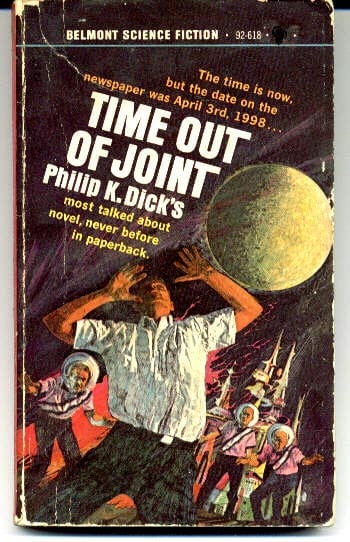
Discouraged by the fact that sf writing was dominated by “trolls and wackos” (he considered Robert Heinlein a fascist, though he borrowed money from him), Dick cranked out eight semi-surrealistic mainstream novels — about, for the most part, the unhappy domestic lives of TV salesmen — by the end of the decade, but couldn’t even get his own agent to read them. Although his wild anti-totalitarian tales were being translated for enthusiastic audiences in countries which understood such matters (Italy, West Germany, Japan, and particularly France-where, like Poe before him, Dick seemed a bohemian, dissident intellectual not taken in by the consensus illusion), in the U.S. Dick was trapped in the sf ghetto. He had great hopes, however, for the success of his novel Time Out of Joint (1959). The plot, about a creative type who realizes, when his sleepy 1958 town slowly begins to dissolve (literally) around him, that it’s actually 1994, and that a militaristic government is employing a large-scale illusion to keep him pacified, was too weird and subversive even for Ace. It was published by Lippincott as a “novel of menace,” and bombed.

Uninterested in the self-congratulatory Beat scene in San Francisco, in ’58 Dick and his wife moved to the remote village of Point Reyes Station. There, he started an affair with Anne, the brilliant but unstable widow of one of the editors of Neurotica magazine. Divorcing Kleo, he married Anne and moved into her ultra-modern house, which became the setting of his great non-sf novel Confessions of A Crap Artist (w. 1959, p. 1975). Cramming his typewriter, books, hi-fi, records, comics, and pulp magazine collection into a shack down the road, Dick grew a beard, threw back enormous amounts of amphetamines, consulted the Bible and the I Ching regularly, and wrote faster than ever, producing eleven novels in 1963-’64 alone. Although he remained deeply concerned with social issues, Dick began now to turn increasingly away from specifically political concerns, and instead toward philosophical and religious questions; besides “What Is Real?” he became equally obsessed with the question “What Is Human?”

Over the course of the ’60s Dick turned out all but a couple of those books on which (what passes for) his reputation rests today. Out-of-control potboilers like Dr. Futurity, Vulcan’s Hammer, The Crack In Space, The Penultimate Truth, The Zap Gun, The Unteleported Man, Counter-Clock World, The Ganymede Takeover, and Our Friends from Frolix 8 flew from his fingers almost as afterthoughts to wacked-out, sometimes astonishingly great works which treat — as one of Dick’s critics notes — “ideas about politics, consciousness, reality, ethics, and love with an intensity of feeling, with comedy and sorrow, that was completely unprecedented in sf.” These include: We Can Build You (w. 1962, p. 1969), in which the brilliant but coldly schizoid Pris Frauenzimmer (based on Dick’s wife Anne) seems far less human than the engaging, depressed Abraham Lincoln simulacrum she helps design; The Man in the High Castle (w. 1961, p. 1962), which is set in an alternate universe where the Axis powers have won W.W.II, and which was written with the help of the I Ching; Martian Time-Slip (w. 1962, p. 1964), in which the Mars of hoary sf mythologizing becomes a Waste Land populated by visionary bushmen, a truth-telling ten-year-old schizophrenic, and a humble repairman who must put reality back together; Dr. Bloodmoney (w. 1963, p. 1965), a post-apocalyptic pastoral whose polyphonous narrative system and well-realized freakish characters almost gave neo-Marxist postmodernist literary critic Fredric Jameson a jouissance attack; The Game-Players of Titan (w. 1963, p. 1963), whose sf plot takes a back seat to psychological and metaphysical questions — and in which a man realizes that his psychiatrist is an alien; The Simulacra (w. 1963, p. 1964), about a future-world run by a seemingly immortal Jackie Onassis-like First Lady, her animatronic president-husbands, and their entertainment-conglomerate handlers; Now Wait For Last Year (w. 1963, p. 1966), in which an invasion of Nazi-like aliens is thwarted by an all-too-human world dictator; Clans of the Alphane Moon (w. 1963-64, p. 1964), which is set on an asylum-world organized into “clans” of madmen, and in which the virtue of caritas is preached by a Ganymedean slime mold; The Three Stigmata of Palmer Eldritch (w. 1964, p. 1965), through which the Gnostic idea that the world is the creation not of God, but of an evil, lesser deity, is burned forever into the reader’s mind via an inescapable odyssey of nested hallucinations — and which features a Martian colony whose settlers are addicted to an escapist Baywatch-type communal hallucination called “Perky Pat”; Do Androids Dream of Electric Sheep? (w. 1966, p. 1968), in which a professional android-hunter starts to wonder if he is an android; Ubik (w. 1966, p. 1969), a pataphysical grotesque set in the “half-life” of preserved dead people, which revisits the shared hallucinations of Eye in the Sky but offers none of that book’s answers — except in the form of salvation-in-a-spray-can (it’s been described as a piece of “guerrilla science fiction”); Galactic Pot-Healer (w. 1967-68, p. 1969), an ironic Jungian parable about a craftsman drafted by a semi-all-powerful alien to help raise a cathedral from the bottom of the ocean; and A Maze of Death (w. 1968, p. 1970), featuring a hair-raising series of shared hallucinations based on Dick’s one and only LSD trip. All at $1,500 a pop.

Distraught at the lack of attention paid to High Castle (although its portrayal of the humanistic Japanese bureaucrat Mr. Tagomi helped it win sf’s Hugo Award in ’63, it was ignored by mainstream critics) and Time-Slip, which he considered to be masterpieces of an entirely new genre of fiction, and upset by his lack of earning power (compared to his wife), Dick had a nervous breakdown at the age of thirty-three. In ’64 he wrote, for an sf fanzine, the essay “Drugs, Hallucinations, and the Quest for Reality,” in which he proposed, à la Aldous Huxley, that “hallucinations, whether induced by psychosis, hypnosis, drugs, toxins, etc., may be merely quantitatively different from what we see, not qualitatively so,” i.e., that what we call “hallucinations” may in fact be the result of extremely sensitive perceptions that “sane” people have been taught to screen out of their consciousnesses. Like Baudelaire, whose rather scholarly mid-career writing on drugs gained him a lasting reputation as a wild-eyed degenerate, and despite his insistence that “one doesn’t have to depend on hallucinations; one can unhinge oneself by many other roads,” Dick became an unwilling hero of the Californian subculture. Timothy Leary, John Lennon (who wanted to film Ubik), and cartoonist Art Spiegelman joined French intellectual pilgrims — one suspects that schizophrenia/”late capitalism” theorists Deleuze and Guattari were among them — in contacting Dick during this period.
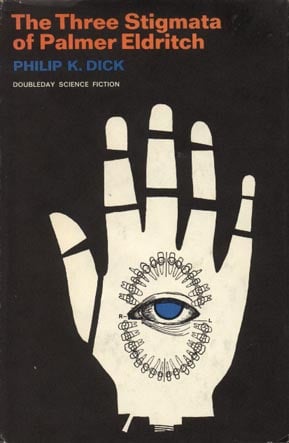
In 1963 Dick had his first, but not last, religious vision: He saw, in the sky, for several days in a row, an “horrifically evil metal visage” — which became the character Palmer Eldritch. Becoming more and more interested in Christianity, Dick befriended James Pike, the far-out Episcopalian Bishop of California; they swapped theories about the true origin of religion until Pike disappeared in 1969. Throughout the ’60s, Dick based all his decisions on the I Ching; his 1965 essay “Schizophrenia & The Book of Changes” discusses the reasons one should never do this. Although Palmer Eldritch was a breakthrough novel, of sorts — it was published in hardcover by Doubleday, and sold fairly well — Dick became increasingly wackier, believing that a) he was under constant surveillance (FBI? CIA? Nazis?), and b) the world was going to end soon. His marriage fell apart in 1964; he was married again by 1966.

After writing the underrated Galactic Pot-Healer, which he felt was a bottom-of-the-barrel effort on his part, Dick drifted into a prolonged funk. He pitched ideas for original TV shows, and even suggested a plot for Mission Impossible, but without any luck. He continued to dose himself with whatever pills — uppers, downers, muscle relaxant — he could buy, or steal from friends’ medicine cabinets; speed dealers and their clients used his suburban Los Angeles home as a clubhouse. Although he was more or less apolitical, he did sign an anti-Vietnam War petition pledging not to pay income taxes: The IRS seized his car. Then, in 1969, Dick took some shitty street speed, and was hospitalized for pancreatitis and acute kidney failure. The following year his fourth wife left him; he immediately invited his gun-toting drug buddies to move in with him. At forty-two, Dick had finally become the rootless, drug-addled bohemian everyone already imagined he was.
Increasingly preoccupied, as one Dick exegete notes, “with solitary anxieties and by a corresponding concern with unexplainable ontological puzzles,” Dick’s books in the ’70s were infrequent (for him), and more explicitly autobiographical than what had come before — but they just kept getting better. Flow My Tears, The Policeman Said (w. 1970, p. 1974) is set in a Nixonian “betrayal state” of police spies, advanced surveillance techniques (bugs, sensors, minicams, even tattoos), and narcotic intrigue; it concerns a TV star who loses his identity in an alternate universe… but really, it’s a love story. To his skeptical colleagues, all this was almost too realistic to be considered science fiction; the book still won sf’s John W. Campbell Memorial Award, however. Dick didn’t write again for three years.
Staying up for days at a time wearing the same wrinkled and filthy Nehru jacket, eating frozen chicken pot pies and drinking protein-fortified milkshakes, downing fistfuls of “white crosses” and blasting opera music (while he inhaled gruesome amounts of snuff), Dick’s world was restricted to bikers, drug addicts, and teenage girls. In 1971 he was admitted to a psychiatric hospital, because he wanted protection from the FBI (CIA?) agents who were tapping his phone and going through his papers. Shortly afterward, his house was in fact burglarized — which only confirmed his fear that one of his books had inadvertently revealed a government secret. (Dick was also fond of acting more crazy than he was; he enjoyed telling people, for example, that the cat’s litter box was bugged.) Eager to get away from his own life, in 1972 he accepted an invitation to attend a Vancouver sf convention as the guest of honor, and fled carrying nothing but a suitcase, a trenchcoat, and a Bible.

At the convention, Dick’s speech “The Android and the Human,” a summation of “an entire life-time of developing thought,” was well-received; shortly afterward he took an overdose of sedatives in an attempt to kill himself. He recovered, and was taken to a rehab center, where — after twenty years — he finally kicked his amphetamine addiction. Back in California he met and married an eighteen-year-old college student named Tessa, who put up with his wild rages, his agoraphobia, and intermittent physical abuse; with her, he had his third and last child. Now Dick started writing again, about his life among the speed freaks, and the result was A Scanner Darkly (1977), one of the greatest works of 20th century fiction. Set in a barely futuristic suburban LA of 1994, it tells the story of “Fred,” a disillusioned narc who enjoys the company of the addicts with whom he lives as “Bob” — whose own drug intake contributes to a toxic brain psychosis complicated by Fred’s new assignment… to spy on Bob. The book ends with a dramatic dedication to Dick’s many friends who’d been killed or permanently damaged by drug abuse; his own name is on the list. That same year Dick wrote to the Department of Justice, offering his assistance in Nixon’s war on drugs, because “drug-abuse is the greatest problem I know of.” Shortly afterward, United Artists paid Dick $2,000 for the film rights to Electric Sheep; the novel was, of course, eventually made into the shallow action movie Blade Runner.
On February 3rd, 1974, shortly before the publication of Flow My Tears, while Dick was recovering from the sodium pentothal he’d received during oral surgery, the doorbell rang. It was a delivery person, a young woman who happened to be wearing a gold icthus (a groovy ’70s Christian fish symbol) on a chain around her neck. Somehow the sight of the fish, plus his mental state at the time, plus the sodium pentothal, added up to a weeks-long flood of visions (Dick saw the Roman world of the Book of Acts stacked “holographically” atop the present), visual hallucinations (“It appeared — in vivid fire, with shining colors and balanced patterns — and released me from every thrall, inner and outer”), and a constant stream of cryptic messages (like “The Buddha is in the park”), often from the radio. Later, having studied Orphic, Gnostic, Zoroastrian, and Buddhist thought, books on brain chemistry, and the Encyclopedia of Philosophy, Dick decided that he’d probably experienced “genetic memories,” or what Plato called anamnesis — the “recollection” of eternal truths. Or something.
After these experiences, as he noted in his Exegesis (a lengthy, handwritten journal devoted to theorizing about the events of “2-3-74”), he realized that the world really was “cardboard, a fake,” and that it was his duty to take on “in battle, as a champion of all human spirits in thrall, every evil, every Iron Imprisoning Thing.” Of course, as with his earlier paranoia about government surveillance, Dick also made fun of his own convictions: Although often frantic and miserable, the Exegesis has its amusing, self-parodistic moments: such as the essay in it entitled, in the voice of Ubik, “The Ultra Hidden (Cryptic) Doctrine: The Secret Meaning of the Great Systems of Theosophy of the World, Openly Revealed for the First Time.” Still not funny to Dick, however, was his fear of authority; in fact, he began to inform on his sf colleagues, accusing them of being part of a Communist conspiracy — led by Stanislaw Lem, his great admirer — to kidnap him. Typically, although he mailed some of these letters to the FBI (they were ignored), he put others in a trashcan behind his house, assuming that whomever was watching him would deliver them.

Professionally speaking — that is, despite his failing health and obvious mental “issues” — 1975 was the greatest year of Dick’s life. A long interview with his friend and admirer Paul Williams appeared in Rolling Stone, and two short interviews with Tony Hiss appeared in The New Yorker (after twenty-five years of writing, he’d finally made it into that magazine’s light-hearted “Talk of the Town” section). Crap Artist was published, his first mainstream novel to see print, and that same year he wrote “Man, Android and Machine,” an essay which sums up his philosophical speculation on the question, “What is Human?” (and which then veers wildly across his speculations about “orthogonal time”). Also that year, the scholarly journal Science-Fiction Studies published a special issue devoted to his work; full of New Left and neo-Marxist analyses of Dick’s Laingian, existentialist, and anti-capitalist themes, it provoked even more unwelcome visits from French intellectuals — whom he drove away by blasting Linda Ronstadt at top volume, and whose words of praise he invariably reported to the authorities.
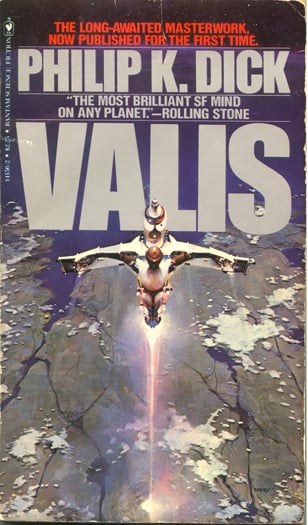
In 1976 Dick’s fifth wife left him and he attempted suicide again, washing heart pills, high blood pressure pills, and antidepressants down with a bottle of wine, slashing his wrists, and locking himself into the garage with the car running. Somehow, he survived. Determined to get back to his old writing habits (his autobiographical essays from this period, like “The Short, Happy Life of a Science Fiction Writer,” cry out with money complaints), Dick typed eighteen hours a day, in an attempt to explore his 2-3-74 experiences through the medium of the novel. In the semi-autobiographical novels Radio Free Albemuth (w. 1976, p. 1985) and Valis (w. 1978, p. 1981) — the latter is about a crackpot named Horselover Fat, and is narrated by Fat’s friend, a character in the book named “Phil Dick,” who writes sf novels… and who reveals that he is Fat — Dick gave free rein to his growing suspicion that everything he’d ever invented in his books was true. In addition, Dick revealed that Richard Nixon was the leader of an evil empire (a “matrix” including Rome, the Third Reich, and the USSR) that had never ended, and that VALIS (a “Vast Active Living Intelligence System” which might be God, an alien intelligence, or technology from the future) was beaming knowledge of all this directly into his mind.
In 1977, Dick gave a long keynote speech at an sf conference in France. Entitled “If You Find This World Bad, You Should See Some of the Others,” it combines Dick’s theory of orthogonal time with a confession that High Castle and Flow My Tears were based on his own fragmentary residual memories of an alternate slave state/world; people left the auditorium, it was later reported, looking as though they’d been hit with a hammer. The following year he wrote “Cosmogony and Cosmology,” a summary of the key insights in the Exegesis (the world is an illusion, projected by a demiurge, from which we must learn to break free); shortly afterwards he wrote “How to Build a Universe That Doesn’t Fall Apart Two Days Later,” a never-delivered speech which playfully summarizes the same theories.

As the Reagan era began, Dick wrote The Divine Invasion (p. 1981), a Gnostic adventure about an alien named Yah who sends a divine child to bring truth and meaning to our occluded world. (He planned to do a follow-up book about present-day “secret Christians” fighting against the hidden evil Empire, but never got to it.) The following year, as Blade Runner neared completion, Dick was offered a $250,000 bribe — the Harrison Ford-starring movie was supposed to be the next Star Wars — to suppress the original version of Electric Sheep in favor of a novelization based on the (vastly inferior) screenplay. He was ready to negotiate; his agent talked him out of it; they compromised by changing the name of the novel to Blade Runner. Dick then turned his attention to The Transmigration of Timothy Archer (w. 1981, p. 1982), a tribute to his friend Bishop Pike and the final book in the Valis trilogy.
Noting in his Exegesis that he didn’t have long to live, Dick planned a novel to be called The Owl in Daylight, about an evolved person in whom all prior (and contradictory) forms of divine wisdom are unified, but never started writing it. Early in 1982, he re-proposed to Tessa, and she accepted. However, after attending the opening of Blade Runner, Dick suffered a stroke. He died shortly thereafter, on March 2nd, at the age of fifty-three.
How Shall We Understand?
“My books (& stories) are intellectual (conceptual) mazes & I am in an intellectual maze in trying to figure out our situation (who we are & how we look into the world, & world as illusion, etc.) because the situation is a maze.” — Dick, from his Exegesis
Stanislaw Lem, the first critic to take Dick seriously as a religious writer, writes that in Dick’s books “monstrous” metaphysical dilemmas “go out into the street and become for every ordinary mortal [a] burning question.” Anyone who’s read half-a-dozen of Dick’s books in a short period of time knows how nauseatingly disorienting an experience that can be; as one critic puts it, he mixes and matches “metaphysical, ontological, anthropological, epistemological, ethical preoccupations with the nature of reality, appearances, knowledge and perception, the authentically human and the artificial, the everyday and the political, the existential and transcendent, the hopeful and the dystopian, the affirmative and entropic.” In a 1969 interview Dick praises science fiction because, he says, it presents its readers with “a great range of ‘as if’ views: The possession of these have the effect of making our minds flexible.” In Dick’s case, most readers would agree, this side-effect may have worked too well.
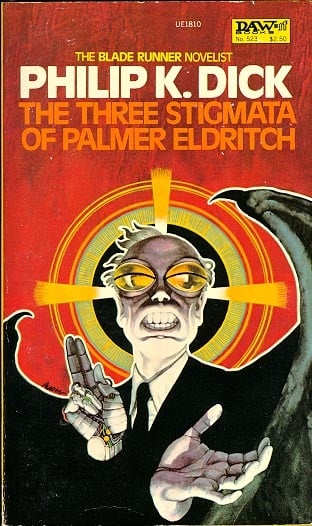
It may be a ridiculous idea, “explaining” Dick’s thought — as expressed through his novels and stories, essays and speeches, interviews and Exegesis entries — because his point is always to estrange not just his readers, but himself. (That’s why when Dick tries, in the Exegesis and his speeches, to explain his “philosophy” it so often seems both banal and insane.) It’s important to understand that Dick was — if not necessarily mentally ill, as he sometimes claimed — a profoundly discouraged and melancholy man, who didn’t always believe that there were any solutions to the scenes of metaphysical vertigo and political-psychological repression in his writing. The title character of The Three Stigmata of Palmer Eldritch, an evil demiurge with brings to mankind a “negative trinity” of “alienation, blurred reality, and despair,” seems to have made his first stop at Dick’s house.
But, as Dick writes, “I think I understand the common ingredient in those whom my writing helps: They cannot or will not blunt their own intimations about the irrational, mysterious nature of reality, &, for them, my corpus of writing is one long ratiocination regarding this inexplicable reality, an integration & presentation, analysis & response & personal history.” This excellent description of his own writing contains, I think, the key to Dick’s thought: We may well be helpless to change anything — since we can’t even know for sure if the world we perceive is real — but we must continue to struggle against the normalizing effect of the status quo. As Dick notes in his Exegesis, “my writing deals with hallucinated worlds, intoxicating & deluding drugs, & psychosis. But my writing acts as an antidote — a detoxifying — not intoxicating — antidote.” Like the bumbling, solitary, cranky repairmen and artisans in Dick’s novels, we, his readers, become “unhinged,” and cannot return to “standard reality-convictions.” Dick inspires us, to paraphrase his biographer Lawrence Sutin, to take the all-important first step — not toward truth, but toward the fact of our own ignorance.
Dick is not, in the final analysis, a philosopher — not in the sense of a metaphysician, anyway, or someone believes that all questions can be resolved into one perfect system. He is, instead, what one critic calls “a prophet of hyperreality, a beleaguered and heroic humanist, a Gnostic visionary of the suburbs.” What passes for Dick’s “philosophy” is nothing but a fragmented and entirely personal collection of theories, which he arranges and re-arranges obsessively, without — however — ever really believing they will all some day fit together. What has been described, pejoratively, as “the fundamental ambivalence of Dick’s imagination” is, it seems to me, a positive attribute: We are compelled, by his principled refusal, or abject inability, to provide us with any answers to the de-stabilizing questions he poses, to remain ironically and radically suspicious of all received forms and norms, and to creatively live the tension of human reality in all its contingency, ambiguity, and absurdity.
How Shall We Be?
“My grand theme: Who is human and who only appears (masquerades) as human?” — Dick, commenting on his story “Second Variety” (1976).
In 1964, the very year Dick was writing The Three Stigmata of Palmer Eldritch, about a drug baron who voluntarily becomes a machine (the three “stigmata” of the title are his new mechanical prostheses) in order to gain ultimate power, T.W. Adorno wrote that the pseudo-existentialist “jargon of authenticity” — which was then being eagerly embraced by German bureaucrats eager to seem less inhuman — involves “the apparent humanization of the thingly,” which in turn merely serves as a camouflage for “the actual turning of man into thing.” Unlike many intellectuals in the ’60s, who prophesied an Age of Aquarius in which man would reach his full potential, and in which humanistic values would triumph over the technocratic militarism of previous decades, Dick and Adorno agreed that even as technology was becoming more and more “user-friendly,” people were becoming not more, but less human all the time.
In “The Android and the Human,” Dick’s speech about androids, robots, and simulacra (words he uses interchangeably for “artificial constructs masquerading as humans”), he describes these “fierce cold things” not as machines, but as “sly and cruel entities that smile as they reach out to shake hands… but their handshake is the grip of death, and their smile has the coldness of the grave.” Androids are not, he argues, different in their essence from humans — just in their behavior. For Dick, whose Exegesis notes that, thanks to the experience of 2-3-74, he’d finally started living the satori he experienced as a child torturing a beetle, the answer to the question “What is Human?” is: kindness, empathy. That’s why it doesn’t matter, to Dick, that those mechanical systems in his stories and novels that display kindness — like the automated taxicab that counsels the protagonist of The Game-Players of Titan not to leave his wife — are programmed to act human; if they act human, they are human. The converse is also true: A sly and cruel human being without empathy, without caritas, who “stands detached, a spectator,” is — Dick insists — no kind of a human at all.
“The greatest change growing across our world these days is probably the momentum of the living toward reification,” Dick writes a couple of years later, in “Man, Android, and Machine.” How does this happen? In his earlier speech, Dick makes a Heideggerian argument that humans can actually be transformed into machines, by being “pounded down, manipulated, made into a means [rather than an end] without one’s knowledge or consent.” The “androidization” of humans, he warns, “has become a science of government and suchlike agencies now [using, he specifically mentions, “pacification drugs” like anti-depressants and tranquilizers, which transform a person who feels “wild grief, anger, fear, and all intense feelings” into someone who is “stable, predictable, not a menace to others”]… until a time will perhaps come when a writer, for example, will not stop writing because someone unplugged his electric typewriter but because someone unplugged him.”
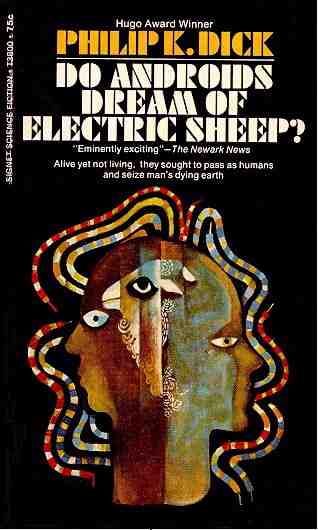
All of which helps explain the strange pseudo-religion called “Mercerism,” in Do Androids Dream of Electric Sheep? — in which grasping the handles of an electronic “empathy box” allows one to “encompass every other living thing.” One of Dick’s best books (despite the fact that it almost never appears on any lists of his “classic” novels), Electric Sheep is not, as in the film version, primarily an adventure story, nor is it primarily a dystopian view of future urban life, nor even a metaphor for man’s ambivalent relationship with technology. What the book is about is the human quality of empathy. The androids have no emotions — the only way that Deckard, the android hunter, can tell them apart from humans is by giving them “empathy tests” — and they’re out to prove that “Mercerism is a swindle… The whole experience of empathy is a swindle.” Deckard’s real task (which Harrison Ford couldn’t have pulled off even if it had been in the script) is to prove them wrong.
Dick’s certainty that empathy and kindness can triumph over even the most insidious entertainment-enforced normality is also the theme of Flow My Tears, which explores the “subtle, intricate relationships which exist between the sexes” — in this case, between General Felix Buckman and his bisexual leather-queen twin-sister/wife — and which ends with Buckman crying over her death, and being embraced by a total stranger. In a 1970 letter to a friend about Flow My Tears, Dick writes, “In answer to the question, ‘what is real?’ the answer is: this kind of overpowering love.” For Dick, in a world where we’re all becoming androidized, acts of unselfish kindness are the only remaining proof of one’s humanity.
What Shall We Believe?
“What I write doesn’t make a whole lot of sense… I certainly see the randomness in my work, & I also see how this fast shuffling of possibility after possibility might eventually, given enough time, juxtapose & disclose something important & automatically overlooked in more orderly thinking… Anyone with my attitude just might stumble onto, by sheer chance & luck… the authentic camouflaged God… might catch him by surprise by poking somewhere unexpectedly.” — Dick, from his Exegesis.
The narrator of Valis (Phil Dick/Horselover Fat) wryly observes that “Fat must have come up with more theories than there are stars in the universe. Every day he developed a new one, more cunning, more exciting, and more fucked.” Dick was, of course, talking about himself. Like Fat’s “Tractates Cryptica Scriptura,” parts of which were beamed directly into the author’s (Dick’s) brain, the Exegesis is a collage of-among other influences — Plato, Parmenides, Ikhnaton, Bruno, Paracelsus, the Rosicrucians, and The Tibetan Book of the Dead. But although Dick proves himself a masterful synthesizer, in “The Android and the Human,” he rejects all systems of explanation, and system-building in general; suggesting that instead “we should be content with the mysterious, the meaningless, the contradictory, the hostile, and most of all the unexplainably warm and giving.”
It’s easy to be content with the unexplainably warm and giving, one imagines. More often, however, Dick’s protagonists discover that the world is a mysterious, meaningless, contradictory, and hostile place in which they must struggle towards truth, meaning, reality. After Eye in the Sky, they never arrive at those destinations… because they just aren’t there. In “How to Build a Universe That Doesn’t Fall Apart Two Days Later,” Dick confesses “I like to build universes that do fall apart” — because “objects, customs, habits, and ways of life must perish so that the authentic human being can live. And it is the authentic human being who matters most, the viable, elastic organism that can bounce back, absorb, and deal with the new.” That’s an odd word for Dick to use: authentic. But it seems like he means it not in the essentialist, but in the existential sense — to mean an ironist who is skeptical of all forms and norms, but who’s also able to creatively invent his or her own.
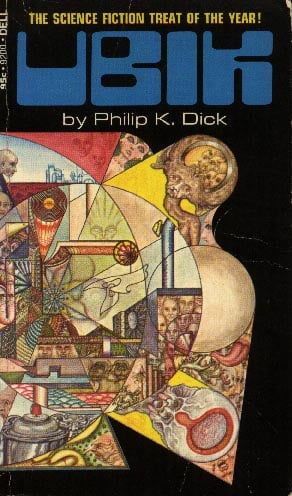
Why should we be skeptical of the real? Dick votary Jean Baudrillard has said recently that “the real is what one must not consent to… Let’s never forget that the real is merely a simulation, a model for regulating and ordering the radical becoming, the radical illusion, of the world and its appearances; for reducing any internal singularity-of events, beings or things-to the common denominator of reality.” For Dick, then, what’s “real” is a simulation, a replica which has replaced that real which cannot be regulated, ordered, or reduced by any philosophy, any theory, any narrative. In Ubik (for which Dick was elected as an honorary member of France’s Jarry-inspired Collège du Pataphysique), an explosion hurls Joe Chip and his colleagues into an irreal, ever-changing world — which may or may not be a hallucination, or a kind of “half-life” (if they’re dead, that is), and which frustrates every interpretation they posit, every attempt to make their experience a meaningful one. After a false ending, which seems to explain everything, a final plot twist suggests that this conclusion, too, is merely an interpretation: “This was just the beginning,” reads the final line.
For Dick, all facts must be dynamited free from the banal, oppressive systems which bind them, and put back into play. For this difficult task, paranoia comes in handy. “I’m out of step. I should yield to reality. I have never yielded to reality. That’s what sf is all about,” reads the preface to The Golden Man (1980) a collection of Dick’s stories. The paranoid, like Mr. Tagomi in High Castle, takes nothing for granted, and knows that “We’re blind moles. Creeping through the soil, feeling with our snoots. We know nothing.” But paranoia, as Dick acknowledges in “The Android and the Human,” is itself a form of system-building, in which our daily experiences seem to take on an intelligibility, a symmetrical totality which simply is not there. “Maybe all systems — that is, any theoretical, verbal, symbolic, semantic, etc., formulation that attempts to act as an all-encompassing, all-explaining hypothesis of what the universe is about —,” he muses, “are manifestations of paranoia.” (This, I think, is where Thomas Pynchon got the line about paranoia and religion being alike, because they both seem to connect everything.) What comes after paranoia, then, for Dick?
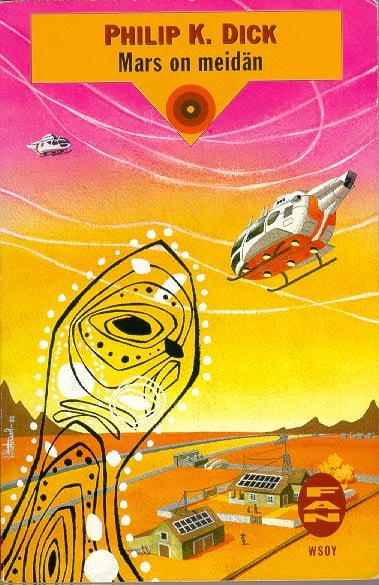
Two words: the void. In a 1970 letter to Commentary, Dick writes that “For me, in each successive novel, the doubt — or rather lack of trust or faith — grows deeper. The split widens, that yawning gap in the earth, into which everything that matters can fall.” This language echoes that of Martian Time-Slip, in which the ten-year-old schizophrenic Manfred sees “a hole as large as a world; the earth disappeared and became black, empty, and nothing… Into the hole the men jumped one by one, until none of them were left. He was alone, with the silent world-hole.” The void, for Dick, is the all-consuming recognition that the world is never anything more than a shared hallucination generated by an atomic catastrophe, or by an potent dose of alien psychoactive drugs, or the flawed creation of an evil demiurge. Ours is an occluded existence, whose true reality is obscured by, among other things, “spurious memories & hallucinated (irreal) worlds.” The recent Dick rip-off movie The Truman Show ends with Jim Carrey stepping through the illusionary horizon into the real world, but for Dick this kind of happy ending is never an option. There is no reality behind the irreal.
How, then, can the authentic person “bounce back, absorb, and deal with” the ever-new which for Dick is reality? “Reality, to me, is not so much something that you perceive, but something you make,” he says in “The Android and the Human.” Not make as in “make into a system” — what Dick means is that reality (as opposed to the irreality which passes for reality) is always something that is in the making, by us. The real arises in the making of the real, in the constant “fast shuffling of possibility after possibility.” Truth is not hidden, for us to discover, according to “The Android and the Human” — it’s “what you do with the bits and pieces of meaningless, puzzling, disappointing, even cruel and crushing fragments all around us that seem to be pieces left over, discarded, from another world entirely that did, maybe, make sense.”
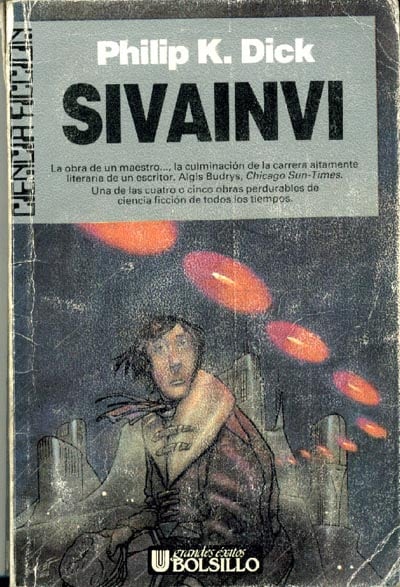
This explains why the humble heroes of so many of Dick’s books are artificers, “variable” men, and repairmen: They are all, in their humble way, creators and not destroyers. This also, I think, explains Dick’s defense of trash (to Lem, above), his late-’60s boast that he was spending “most of [my] time listening to first Scarlatti and then the Jefferson Airplane and the Gotterdämmerung, in an attempt to fit them all together,” and the final paragraph of Valis, in which the narrator (Dick) stations himself in front of the TV, waiting for a sign. Reality may be just a simulation, but the “fake” — the flotsam and jetsam of pop culture — may turn out to be the bricks and mortar with which we can construct our own reality.
What Shall We Do?
“I mean, after all, you have to consider, we’re only made of dust. That’s admittedly not much to go on and we shouldn’t forget that. But even considering… we’re not doing too bad. So I personally have faith that even in this lousy situation we’re faced with we can make it. You get me?” — interoffice memo from Barney Mayerson, in The Three Stigmata of Palmer Eldritch (1965)
Dick writes, about the above memo, that he wrote Palmer Eldritch for no other reason than to provide background context for this, his statement of faith “not so much in God, either a good god or a bad god or both-but in ourselves.” Which is great, and everything… but if the answer to “What is Real?” is “Nothing, except what we make ourselves,” how are we supposed to proceed? We already know, of course, that (as he says in his Afterword to The Golden Man) Dick’s “anger is generated out of love; it is love baffled,” and that for Dick the little virtues — “love, making exceptions, humor, determination” — are vital, but once we’ve become lucidly aware of the irreality in which we live, how can we move from empathy to action?
In his 1974 essay “Who Is an SF Writer?” Dick suggests that “the sf writer is able to dissolve the normal absolute quality that the objects (our actual environment, our daily routine) have; he has cut us loose enough to put us in a third space, neither the concrete nor the abstract, but something unique, something connected to both and hence relevant… the daily tyranny of our immediate world, which we generally succumb to, becoming passive in the hands of and accepting as immutable, this is broken, this tyranny of concrete reality.” For Dick, despite the fact that the “normal absolute” reality is not as concrete as it seems, the passivity of nihilism is not acceptable; in fact, waking up to irreality is energizing. This is the other central theme of Electric Sheep (and Martian Time-Slip, and The Penultimate Truth, among others): Never surrender. “I can’t stand the way you androids give up,” Deckard tells the android Rachel, who passively waits for him to kill her — why wasn’t this scene in the movie?
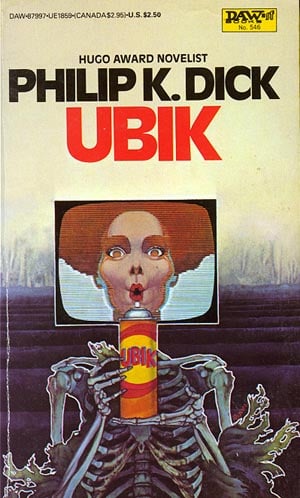
Besides empathy, then, for Dick a cranky stubbornness is the most vital quality a person can have. In a 1970 letter, Dick writes that “I know only one thing about my novels. In them again and again, this minor man asserts himself in all his hasty, sweaty strength… Perhaps [my critics] are bothered by the fact that what I trust is so very small. They want something vaster. I have news for them: there is nothing vaster.” The humble pot-healers, doctors, musical instrument-makers, and tire re-treaders of Dick’s stories are survivors, heroes-as-failures, “the guy who has to pick up the tab.” Unable to manage their own lives (Joe Chip, in Ubik, is threatened with a lawsuit by his own front door, to whom he owes money), their very inertia often becomes a form of heroism. Unlike Arnold Schwarzenegger in Total Recall — which is based on the 1966 Dick story “We Can Remember It For You Wholesale” — who instantly goes from being Joe Lunchpail to, well, Arnold Schwarzenegger, heroism for Dick is expressed by a schlemiel like Barney Mayerson, in Palmer Eldritch, who decides to stay on in the mind-numbing Martian colony, to “work on my garden up top and whatever else they do. Build irrigation systems and like that.” This sums up Dick’s mid-’60s notion of Right Action.

Later, however, Dick’s view of post-metaphysical-apocalypse Right Action became more complicated. Dick’s portrait of a future (present?) in which anyone who attempts to resist capitalism, authoritarianism, or normality in general is enveloped in a net of hallucinations is a vision of hell, one in which all taken-for-granted notions of good and evil are destroyed. “We do not have the ideal world such as we should like, where morality is easy because cognition is easy,” Mr. Tagomi says in High Castle; in fact, as faux-Christ Wilbur Mercer tells Deckard in Electric Sheep, “You will be required to do wrong no matter where you go. It is the basic condition of life.” For the later, Gnostic Dick, the world is a creation of an evil deity, entropy (“gubble,” in Martian Time-Slip) is on the loose, and we are all becoming cold machines with smiles of death plastered on our faces. What, then, to do?
In “The Android and the Human,” Dick suggests that the young sociopaths with whom he was in those days spending all his time had provided him with an answer. Their criminal perversity and willfulness, he writes, are guarantors that they will never be “unplugged,” because they’d never allow themselves to become plugged-in in the first place. “If, as it seems, we are in the process of becoming a totalitarian society,” he concludes, “the thing would be: cheat, lie, evade, fake it, be elsewhere, forge documents, build improved electronic gadgets in your garage that’ll outwit the gadgets used by the authorities.” Why? Because “even the most base schemes of human beings are preferable to the most exalted tropisms of machines” (which substitute means for ends), and because “we can tell and tell [people like that] what to do, but when the time comes for him to perform, all the subliminal instruction, all the ideological briefing, all the tranquilizing drugs, all the psychotherapy are a waste. He just plain will not jump when the whip is cracked.” This, for Dick, is what passes for a vision of the Good.
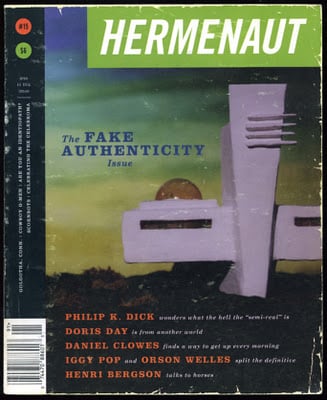
READ MORE essays by Joshua Glenn, originally published in: THE BAFFLER | BOSTON GLOBE IDEAS | BRAINIAC | CABINET | FEED | HERMENAUT | HILOBROW | HILOBROW: GENERATIONS | HILOBROW: RADIUM AGE SCIENCE FICTION | HILOBROW: SHOCKING BLOCKING | THE IDLER | IO9 | N+1 | NEW YORK TIMES BOOK REVIEW | SEMIONAUT | SLATE
Joshua Glenn’s books include UNBORED: THE ESSENTIAL FIELD GUIDE TO SERIOUS FUN (with Elizabeth Foy Larsen); and SIGNIFICANT OBJECTS: 100 EXTRAORDINARY STORIES ABOUT ORDINARY THINGS (with Rob Walker).
